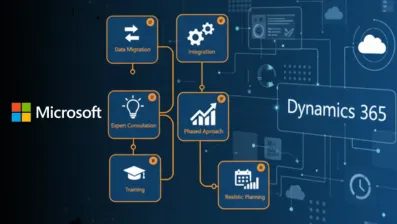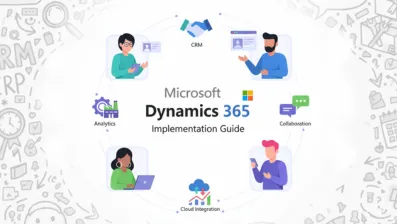The use of technology in business operations can result in either improving or reducing the overall productivity.
Hence, when choosing a business management system, the business has multiple options, and they face a common concern that is “What is the difference between Business Central vs Dynamics 365?”.
Both belong to Microsoft’s line of business tools and are made to help with sales, finance, and daily operations. While they share many features, but are not meant for the same type of business.
Microsoft Dynamics 365 is designed for medium and large organizations that need detailed control over departments, customers, and data. It includes a full set of CRM and ERP applications that can be connected and customized.
Business Central, on the other hand, works better for small and mid-sized companies that want an easier way to manage finances, inventory, and sales in one place.
But this is not all about Business Central vs Dynamics 365; several other factors and approaches exist that help decide which platform suits your business the best.
In this blog, you will learn what each platform offers, how they work, their main features, pricing, and setup process. You will also see the key difference between Dynamics 365 vs Business Central to help you choose the right one for your business needs.
Microsoft Dynamics 365 Overview
Microsoft Dynamics 365 is a business platform that helps companies manage sales, marketing, finance, and customer service in one place. It combines CRM and ERP tools, which means it can handle both customer management and business operations together, resulting in teams saving time and performing more efficiently.
The system is built on Microsoft Azure, which keeps it secure and reliable. Since it is part of the Microsoft family, it connects easily with Microsoft 365, Teams, Power BI, and LinkedIn. This makes it easier for users to move data between tools, share information, and track performance in real time.
Dynamics 365 comes with different applications, such as Sales, Marketing, Finance, and Supply Chain Management. These applications are called modules, and each module can be used alone or integrated with the complete system. Such flexibility provides modern businesses the freedom to start small and add more features as they grow.
A key reason why Dynamics 365 appeals to businesses is how it organizes data. It pulls information from different departments into a unified dashboard, so teams can get a full view of what is happening in the business. This helps managers make better plans, monitor progress, and find new growth opportunities.
In simple terms, Microsoft Dynamics 365 implementation gives businesses the tools they need to stay connected, improve teamwork, and make smarter decisions every day.
Benefits, Pros, and Cons of Microsoft Dynamics 365
Microsoft Dynamics 365 is a business platform that helps companies integrate diversified business operations such as sales, marketing, finance, and customer service in one place.
It not only connects teams but also brings data together and helps make better decisions through automation and real-time insights. A key benefit of Dynamics 365 is that it is built on Microsoft Azure, which makes it secure, fast, and reliable.
These features allow Microsoft Dynamics 365 to work for companies of all sizes and industries, offering flexibility, control, and smart data use. The system combines the functions of CRM and ERP, allowing businesses to handle both customers and operations through one platform.
Like every system, it has many pros along with a few challenges that businesses should know about when focusing on Business Central vs Microsoft Dynamics 365.
► Pros of Microsoft Dynamics 365
The key benefits or the pros that make Dynamics 365 stand out from other business management tools are:
1. Connects Easily With Other Microsoft Tools
Dynamics 365, being a part of the Microsoft family, is able to connect seamlessly with Microsoft 365, Teams, Power BI, and LinkedIn.
Businesses can move data between these tools without switching tabs or apps, hence getting a common, unified platform to perform their everyday operations with ease.
For example, you can reply to a client in Outlook, update their record in Dynamics 365, and check reports in Power BI, without logging in to different tools.
2. Combines CRM and ERP Features
The platform manages customer relationships and business operations in one space. It lets teams handle sales, marketing, finance, and supply chain management using shared data. This reduces double work and makes decision-making faster and more accurate.
3. Flexible and Adapts To Business Growth
Dynamics 365 is made up of multiple individual modules like Sales, Marketing, Finance, and Supply Chain.
Hence, companies can start with the basics, i.e., what they need urgently, and as the business scales, they can add more apps or plan for upgrades. This modular design keeps it simple for small businesses and powerful for large organizations.
4. Cloud-Based and Mobile-Friendly
As Dynamics 365 runs on the Microsoft Azure cloud, users can log in from anywhere using a computer or phone. This supports remote work and keeps teams connected. The mobile app also helps employees update data and view reports while on the move.
5. Real-Time Data and AI Insights
Dynamics 365 provides clear, real-time information on performance and operations. Its AI tools, such as Microsoft Copilot, help predict outcomes, create quick reports, and suggest actions to improve work results.
6. Built To Support Every Industry
Microsoft offers ready-made versions of Dynamics 365 for industries like retail, manufacturing, and healthcare, as well as custom versions to suit any specific requirement of the modern industries.
Hence, businesses can choose workflows and reports designed as per their specific needs, ensuring improved productivity.
7. Secure and Compliant System
Security is one of Microsoft’s main strengths. Dynamics 365 follows global standards for data protection and privacy. It includes encryption, access control, and backup options, which help protect sensitive information.
8. Regular Updates and Upgrades
Microsoft keeps improving the platform with regular updates and the latest Microsoft Dynamics 365 trends. The businesses can leverage the power of AI, automation, and low-code development with Dynamics 365.
Tools like Copilot AI and the Power Platform help users build custom apps and automate work without complex coding.
► Cons of Microsoft Dynamics 365
Along with the potential benefits and positive aspects, there are certain challenges and cons that businesses must consider. These cons can help them find the difference between Business Central vs Dynamics 365 and decide accordingly.
1. Setup Can Take Time
Because Dynamics 365 has many apps and custom modules. Hence, the initial setup can take longer for new users. Also, the businesses with complex systems may need expert help for smooth configuration, resulting in extended setup time.
2. Training is Often Needed
The platform is powerful and can help businesses optimize their performance and productivity, but it can feel confusing at first. Teams usually need intensive training sessions to learn how to use all features effectively and get the best results.
3. Added Costs for Customization
The basic versions of Microsoft Dynamics 365 cover most needs, but adding more modules, users, or custom tools can increase the total cost. Hence, businesses need to plan their budgets to support future upgrades as the business scales.
4. Technical Support Required
While Dynamics 365 includes low-code tools, creating detailed workflows or integrating third-party software often needs help from developers or Microsoft partners.
5. Smaller App Marketplace
Compared to other tools and platforms, Dynamics 365 offers fewer ready-to-use apps from external vendors. Companies that rely heavily on third-party integrations may have to build custom solutions instead.
In simpler terms, it can be stated that Microsoft Dynamics 365 gives companies the ability to manage everything in one place, from customer data to finances and daily operations. It combines flexibility, security, and smart insights, making it a smart choice for businesses that want a connected and scalable system.
► Pricing of Microsoft Dynamics 365
The price of Microsoft Dynamics 365 depends on which apps you choose and how many people in your company will use them. Each app is priced per user each month, so you only pay for what your business actually needs.
As of 2025, the Sales Professional plan costs about US $65 per user per month, while the Sales Enterprise plan is around US $105 per user per month. For customer support, the Customer Service Professional plan starts at US $50 per user per month. Advanced modules like Finance or Supply Chain Management are priced at about US $210 per user per month.
In addition to licenses, businesses should plan for setup and training costs. The Microsoft Dynamics 365 implementation cost can change based on how much customization and support a company needs. Prices may also vary depending on the region, deployment type, and project size.
Business Central Overview
Business Central is also a business management system that helps small and mid-sized companies handle all their daily work in one place.
If you are comparing Business Central vs Microsoft Dynamics 365, then it is part of the Microsoft Dynamics 365 family and includes tools for finance, sales, inventory, and supply chain management. Because it runs on Microsoft Azure, it is safe, fast, and easy to use from anywhere.
The main goal of Business Central is to make business management simple. It brings together data from accounting, sales, and customer records into a single, clear view, allowing business owners and teams to make quick, informed decisions without switching between different systems.
It also connects easily with other Microsoft tools such as Microsoft 365, Teams, and Power BI, so users can create reports, share files, and track performance in real time.
Business Central offers the flexibility to be used on the cloud or on company servers, depending on what suits the business requirements the best. It also includes smart automation features that handle tasks like sending invoices, tracking payments, and managing stock levels automatically. Also, the system can be customized as per the different industries, such as retail, manufacturing, or services.
With its built-in reports and dashboards, Business Central helps small businesses save time, reduce errors, and stay on top of operations without needing complex systems or large IT support.
Benefits, Pros, and Cons of Business Central
Business Central is built for companies that are looking for a simple and convenient way to manage their finances, sales, and daily operations.
It brings everything together in one place, so teams can work faster and with fewer mistakes. As part of the Microsoft Dynamics 365 family, it connects easily with other Microsoft tools and runs on Microsoft Azure, which keeps it secure, reliable, and easy to access from anywhere.
The goal of Business Central is to help businesses save time and make better decisions without needing complex systems or large IT teams. It offers many useful features that support daily tasks and long-term growth, though it also comes with some challenges to consider.
► Pros of Business Central
If you are still wondering “What is the difference between Business Central vs Dynamics 365?”, then focusing on the pros or the benefits of Business Central will help you understand better.
1. Manages All Key Business Areas
Business Central combines finance, sales, purchasing, and inventory management in one system. This helps businesses avoid switching between different software and reduces the chance of data errors.
Teams can view everything from cash flow to customer orders in one dashboard, which makes work faster and simpler.
2. Works Smoothly With Microsoft tools
It connects well with Microsoft 365, Teams, and Power BI. Employees can send invoices through Outlook, review reports in Power BI, and share updates on Teams.
Because everything is linked, data moves automatically between apps, which saves time and keeps information accurate.
3. Simple and User-Friendly Interface
The interface is clean and easy to understand. People who already use Microsoft tools will find it familiar, which makes learning faster.
Businesses can adjust dashboards, reports, and layouts to match how they work without needing complex setup steps.
4. Flexible Deployment and Cloud Access
Since it runs on Microsoft Azure, Business Central can be used anywhere with an internet connection. It also supports on-premise installation for businesses that prefer to store data locally.
This flexibility helps companies choose what suits them best without losing performance or security.
5. Saves Time With Automation
The system can automate regular tasks like sending invoices, recording payments, and tracking stock. This helps reduce manual effort and human error.
With automation, staff can focus more on customer service and business growth rather than routine work.
6. Strong Finance and Accounting Features
Business Central provides detailed financial tools that handle budgets, reports, and cash flow. It supports multiple currencies and regional tax rules, making it suitable for businesses that operate in different countries.
Hence, Managers can view real-time financial data to make better business decisions. It is also one of the key differences between D365 and Business Central.
7. Real-Time Visibility and Reports
The system collects data from across departments and presents it in simple, easy-to-understand reports. Integration with Power BI adds powerful visual analytics, so users can track sales, monitor expenses, and spot trends as they happen.
8. Grows With Your Business
One major benefit of Business Central is scalability. Companies can start with the core tools they need and add more users, apps, or features as they expand. It grows with the business, rather than needing to be replaced as operations get bigger.
9. Reliable Security and Compliance
Security is built into the system through Microsoft Azure. It includes encryption, controlled user access, and automatic data backups. This ensures that important information stays safe and meets global security standards.
10. Constant Updates and Innovation
Microsoft updates Business Central several times a year. Each update improves performance, fixes bugs, and adds new features. Microsoft is also investing in AI and automation tools to make the platform even more efficient and easier to use for everyone.
► Cons of Business Central
If you are comparing Business Central vs Dynamics 365, then focusing on the cons of Business Central is important to make a fair comparison.
1. Setup Takes Effort and Planning
Installing and configuring Business Central can take time, especially for companies switching from older systems.
Businesses need to move data, adjust settings, and train employees before going live. Without proper planning, the process may feel slow or confusing.
2. Limited Features for Large Organizations
Since Business Central is meant for small and mid-sized businesses, it does not include all the advanced tools found in Microsoft Dynamics 365.
Larger organizations that need more detailed automation or complex reporting may outgrow it over time, hence defining the key difference between Business Central vs Microsoft Dynamics 365.
3. Advanced Customization May Need Expert Help
Basic setup is simple, but creating custom reports or integrating with other software often requires technical knowledge.
Many companies work with a Microsoft partner or look for an expert mobile application development company for deeper customization or integration, which can add to costs.
4. Costs Increase With Extra Modules
The base plan is affordable, but adding more users, apps, or industry-specific features can increase the total price.
Businesses are recommended to be aware of these cost hikes to avoid surprises later and ensure a smoother operational expansion.
5. Limited Third-Party App Selection
Compared to platforms like Salesforce or Microsoft Dynamics 365, Business Central has fewer third-party extensions. Businesses that rely on niche integrations may need to build custom connections instead of using ready-made ones.
6. Requires Consistent Updates and Support
Since it’s cloud-based, updates happen automatically. While this keeps the system current, some companies find frequent updates disruptive if they haven’t trained staff on new features. It’s important to schedule regular reviews and short training sessions.
7. Complex Learning For New Users
Although it’s easier than many systems, Business Central is still complicated for new users. Teams that are used to simple spreadsheets or older software might need time to adapt to the new setup and features.
8. Internet-Dependency For Cloud Users
The cloud version requires a stable internet connection. In areas with weak connectivity, performance might drop. Companies that work in such locations often choose the on-premise version instead.
9. Limited Customization for Certain Industries
While Business Central can be adapted to most business types, it doesn’t always fit highly specialized industries out of the box. Some custom modules may need to be developed, which can increase the setup time.
► Pricing of Business Central
The cost of Business Central depends on how many users you have and which plan you choose. Microsoft charges a monthly fee per user, so you only pay for the features your business actually needs.
As of 2025, the Essentials plan costs about US $70 per user each month, and the Premium plan costs around US $100 per user each month. There is also a Device license option for shared devices, such as a terminal used by multiple employees in a warehouse or store, which costs about US $40 per device each month.
Microsoft has announced a small price increase effective November 1, 2025. The Essentials plan will rise to US $80 per user each month, and the Premium plan will move to US $110 per user each month. Businesses that want to save costs can start earlier to lock in current rates before the change takes effect.
Key Difference Between Microsoft Dynamics 365 vs Business Central
Both Microsoft Dynamics 365 and Business Central help businesses manage sales, finance, and daily operations, but they are made for different kinds of users.
Knowing the key difference between Dynamics 365 vs Business Central can help a company choose the one that fits its size, goals, and budget.
Microsoft Dynamics 365 is a large and powerful platform that combines CRM and ERP tools. It is built for medium to large organizations that manage complex processes, multiple teams, and global operations. Business Central is designed mainly for small and mid-sized businesses that need an easier and more affordable way to handle finance, inventory, and customer relationships.
The table below shows the key differences between D365 vs Business Central and the main points that separate the two systems.
Feature | Microsoft Dynamics 365 | Business Central |
Target Business | Mid-sized to large companies | Small to mid-sized companies |
Purpose | Combines CRM and ERP for complete business management | Focuses mainly on ERP with basic CRM tools |
Core Modules | Sales, Marketing, Finance, Supply Chain, HR, and Customer Service | Finance, Sales, Purchasing, Inventory, and Projects |
Deployment | Cloud, on-premise, or hybrid setup | Cloud or on-premise setup |
Integration | Connects with Microsoft 365, Teams, Power BI, and LinkedIn | Connects with Microsoft 365, Teams, and Power BI |
Customization | Highly customizable through Power Platform and low-code tools | Easier customization with simple setup options |
AI Features | Includes Copilot AI for real-time insights and automation | Includes automation for finance, reporting, and operations |
Data Handling | Manages large, complex data across departments | Handles simple transactional data for smaller teams |
Scalability | Scales for enterprise-level operations | Scales easily as small businesses grow |
App Marketplace | Large with thousands of third-party extensions | Smaller, focused on small business solutions |
Pricing | Starts from US $50–$210 per user/month, depending on modules | Starts from US $70–$110 per user/month, depending on plan |
Ease of Use | Takes time to learn due to the advanced features | Easier to learn with a simple design and setup |
Implementation | Takes longer because of setup and integrations | Quicker setup and faster deployment |
The difference between Business Central vs Dynamics 365 mainly comes down to scale and complexity.
Dynamics 365 works best for organizations that need deep control, multiple modules, and AI-driven insights. Business Central, on the other hand, is better for smaller teams that want to manage accounting, sales, and inventory in one easy system without high costs or complex setup.
Which One to Choose?
Choosing between Microsoft Dynamics 365 vs Business Central depends on what your business does, how big your team is, and how much control you need over your data and processes.
Both systems are from Microsoft and built to help companies stay organized, but they are designed for different types of users.
Microsoft Dynamics 365 is best for medium and large businesses that have complex operations and want a complete system that connects every department. It combines CRM and ERP tools, helping manage sales, marketing, finance, and supply chain in one place.
Its AI features, such as Copilot, give real-time insights and help with forecasting, automation, and decision-making. It also supports detailed customization, which makes it easier to match the system to specific business processes. This makes Dynamics 365 a good fit for companies that need more flexibility and scalability as they grow.
Business Central works better for small and mid-sized businesses that want something simpler and faster to use. It focuses mainly on accounting, sales, and inventory, and provides clear dashboards that show all important business data in one view.
It is easy to set up, has a friendly interface, and connects smoothly with Microsoft 365, Teams, and Power BI. Businesses that already use Microsoft tools find it especially useful because it keeps everything in one ecosystem.
If your company needs advanced reporting, multiple apps, and deeper automation, Dynamics 365 is the stronger option. But if you want an easy and cost-effective system that covers the essentials without a heavy setup, Business Central is usually the better choice.
Both Business Central vs Microsoft Dynamics 365 help businesses stay efficient, improve teamwork, and make smarter decisions with connected tools.
How Can DotStark Help?
Selecting the right business management system is not only about comparing features, but also about finding the right fit for how your company operates.
As a leading Microsoft Dynamics 365 consulting services provider, DotStark helps businesses evaluate their goals, workflows, and future plans before recommending a suitable platform.
Our team focuses on assisting businesses with solution that aligns with their structure, budget, and operational needs.
From initial planning to complete system setup, we manage the process with care and precision. We make sure the transition is smooth, with minimal disruption to your ongoing work. Our professionals also provide user training and continuous support so that your team can adapt quickly and use the system effectively.
Beyond implementation, we assist in customizing the system to match specific processes and reporting needs. If your business requires mobile access or additional functionality, our technical team can develop integrated applications that support remote use and real-time data sharing.
With a structured approach and ongoing guidance, we help businesses simplify their operations, improve collaboration, and gain better control over their performance. Our focus remains on delivering practical solutions that strengthen business efficiency and long-term growth.
Conclusion
Both Microsoft Dynamics 365 and Business Central are strong business systems that help companies manage their daily operations more effectively. They share a common goal to bring people, data, and processes together, but they are made for different kinds of businesses.
Microsoft Dynamics 365 is a better fit for medium and large organizations that want more detailed control and customization. Its advanced automation and analytics help large teams manage data and plan better. Businesses that deal with complex operations or multiple departments usually find it more suitable.
Business Central is designed for small and mid-sized companies that need a simple and affordable system to manage their work. It helps handle accounting, inventory, and sales without requiring heavy setup or large budgets. Its clean design, flexibility, and cloud access make it easy for teams to start using it quickly.
It can be concluded that the choice between the two depends on your business size, goals, and daily operations. Both systems make work easier, connect teams, and give businesses better control over their performance and growth.
Frequently Asked Questions
The main difference is who they are made for. Microsoft Dynamics 365 is built for large companies that need detailed control and advanced features. Business Central is made for small and mid-sized businesses that want a simpler system to handle accounting, inventory, and daily tasks in one place.
Yes, they can, but it might be more complex and expensive than what most small businesses need. Business Central is usually a better choice because it offers the key features small teams need without the heavy setup or cost that comes with larger systems.
Yes. Business Central is one of the products within the Microsoft Dynamics 365 suite. It focuses more on managing finance, sales, and supply chain operations, while other Dynamics 365 apps handle areas like marketing, customer service, and human resources.
Microsoft Dynamics 365 offers more advanced reporting and analytics, supported by AI-driven insights and forecasting. Business Central provides strong financial and operational reports that are easier to use. Both systems connect with Power BI, allowing users to visualize data in real time.
The final decision depends on your business size, budget, and how complex your operations are. If your company needs detailed reporting, automation, and custom modules, Microsoft Dynamics 365 is a better fit. If you want something easier to set up and manage, Business Central will work better for you.

.webp)



.webp)

.webp)

.webp)

.webp)

.webp)

.webp)


 +91 9680599916
+91 9680599916
 vanshika@dotstark.com
vanshika@dotstark.com
